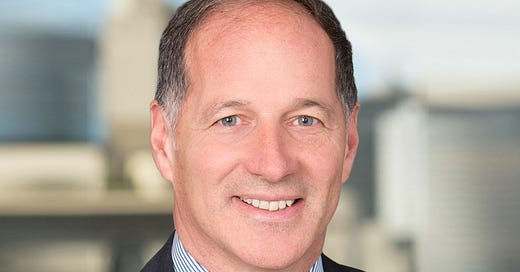Successful growth investing is not about "thinking big"
Mark Baribeau and his Global Equity Opportunities team at Jennison Associates have an incredible track record, but it hasn't come from making big predictions.
It has not been easy for active managers to outperform the MSCI World Index over the past decade. Yet Jennison’s Global Equity Opportunities strategy has achieved that feat by some margin – its 11.8% annualised return over the past 10 years in dollar terms is three percentage points better than the 8.8% gain in the MSCI World.
This is the same underlying strategy that Jennison is managing in the Curate Global Growth Equity Fund. It seeks to identify best-in-industry businesses set for significant growth.
At face value, this seems like an approach that is difficult to make repeatable. How does anyone anticipate Amazon or Tencent? However, lead manager Mark Baribeau says that in order to be consistently successful, you don’t need to make huge predictions.
“You never have to try to predict how big something is going to be,” Baribeau (pictured above) says. “You only have to figure out two things.”
The first, he says, is whether there is a use case for what the company is doing.
“Is it going to save time and money, is it more convenient, is it lower cost than anything else? Does the consumer model make sense? And are you seeing the first signs of validation of that?
“What you want to see is a take-off in user growth and sales. If people are interested, there’s the validation.”
The Netflix lesson
Secondly, he says you need to understand what the business model generates in unit economics.
“Even if they might be losing money now because they are spending on distribution and sales, you want to see that every incremental sale they make generates a certain profit,” Baribeau explains. “And then you need to ask how big the addressable market could be.”
He uses Netflix as an example.
“There are 60 million households in the US with broadband,” Baribeau says. “Netflix had 10 million subscribers, and we thought that could go to 60 million. We looked at what their profit margin will be along the way as they scaled, and saw that this this could become a meaningful company.”
“You never have to think big”
The use case was clearly there, since it is far more convenient to push a button to get the movie you want than to go to the video store to find it. With consumers moving towards wanting more convenience, this was compelling.
“To own Netflix in 2012 you didn’t need to predict that it was going to become the biggest media company in the world with 300 million global subscribers,” Baribeau says. “All you needed to predict was that it was going to go from 10 million subscribers to 20 million, to 30 million, on its way to 60 million.
“You didn’t’ need to predict that they would invest in their own content, start streaming live sports, and put just about everyone else in media out of business. You never have to think big. You just have to say: this is a great business model, with a real use case, it has great management, people like it, so in the next three years how big could it be?”
The big compounders
He noted that the really good companies will stay in the portfolio longer because they morph into new things. Amazon, for example, used its excess computing power to form Amazon Web Services, which is now far more valuable than its retail business. And Mercado Libre developed a digital payment mechanism that is worth much more than its e-commerce platform.
“We didn’t need to predict that’s what would happen,” Baribeau says. “We just had to decide that what are they doing today looks really attractive.
“Companies like this keep adding innovation on top of their original platform in areas you never thought about. That’s how you end up with the big compounders. But very few ever get there. Most are a cool story for three or five years and there’s no second act.”
“You have to act quickly if new data points come out and you are wrong”
This is why Jennison’s global equity approach is not just focused on finding these opportunities, but also being ruthless about selling them when “things start to crack”.
“We’ve learned that you have to act quickly if new data points come out and you are wrong,” Baribeau says. “If you take a 10% or 20% hit, that’s not a big deal if you’ve made a lot of money on the way up. But you don’t want to lose 80%.”
Their approach to Tesla epitomises this.
“We owned it for almost 12 years, from the IPO,” Baribeau says. “And if you look at our long-term performance, Tesla is the number one contributor to alpha.”
Biggest differentiator
By September 2022, the stock made up 9% of the portfolio. But in the first week of October that year, Tesla reported quarterly sales, and for the first time it missed analyst forecasts.
“Tesla’s market penetration was only 15%, so it still had a lot of room to grow. But it missed,” Baribeau says.
“The second factor in the back of our minds was we knew Elon Musk was going to lose the court case and be forced to buy Twitter and sell a lot of Tesla to do it. We also knew he was going to turn it into a megaphone that would hurt his brand, although we didn’t know how much.
“By the end of December, we had just a 1% position.”
This illustrates how Baribeau and his team are willing and able to act without sentimentality towards a stock.
“When things start to crack and consensus expectations are higher than what is realised in what is already a well-known story, trading on a high PE, you have to liquidate,” Baribeau says. “That sell discipline is the biggest differentiator for our product.”






